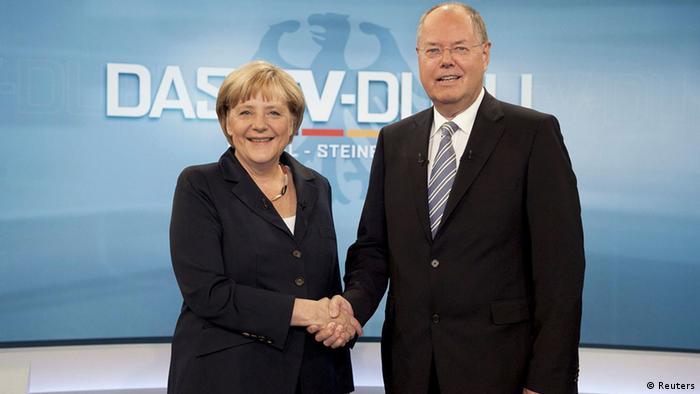[fblike]
 On September 22nd, German voters handed Chancellor Angela Merkel her biggest electoral triumph and put her in a position to lead her third consecutive government. Merkel’s center-right Christian Democratic Union (CDU) and its sister party, the Christian Social Union (CSU) took 41.5% of the vote. The Social Democratic Party (SPD) took second place with 25.7% of the vote and the communist leaning Left Party took 8.6% of the vote. However, the CDU/CSU only won 311 seats in the 630 seat German Bundestag, which leaves it five seats shy of a majority. The CDU/CSU’s coalition partner, the Free Democratic Party (FDP) failed to win representation in parliament for the first time since 1949, so the CDU/CSU must now enter into a coalition with the SPD or the Green Party, which took 8.4% of the vote, to govern the country. A failure to form a new coalition would inaugurate new elections. The German election was watched closely by European political observers because Germany’s economy is the largest in Europe and it guides a great deal of European Union (EU) policy. A Merkel defeat might have spelled significant changes for how the EU is handling debtor countries like Greece and further complicated the process of European integration. Her victory shows that German voters have endorsed her handling of the German economy through the euro zone crisis that began in 2010.
On September 22nd, German voters handed Chancellor Angela Merkel her biggest electoral triumph and put her in a position to lead her third consecutive government. Merkel’s center-right Christian Democratic Union (CDU) and its sister party, the Christian Social Union (CSU) took 41.5% of the vote. The Social Democratic Party (SPD) took second place with 25.7% of the vote and the communist leaning Left Party took 8.6% of the vote. However, the CDU/CSU only won 311 seats in the 630 seat German Bundestag, which leaves it five seats shy of a majority. The CDU/CSU’s coalition partner, the Free Democratic Party (FDP) failed to win representation in parliament for the first time since 1949, so the CDU/CSU must now enter into a coalition with the SPD or the Green Party, which took 8.4% of the vote, to govern the country. A failure to form a new coalition would inaugurate new elections. The German election was watched closely by European political observers because Germany’s economy is the largest in Europe and it guides a great deal of European Union (EU) policy. A Merkel defeat might have spelled significant changes for how the EU is handling debtor countries like Greece and further complicated the process of European integration. Her victory shows that German voters have endorsed her handling of the German economy through the euro zone crisis that began in 2010.
This topic brief will discuss why the German elections matter and their outcome, the impact of the German elections on German domestic issues, and the impact of the German elections on Germany’s international role and its dealings with the European Union.
Readers are also encouraged to use the links below and in the related R&D to bolster their files about this topic.


